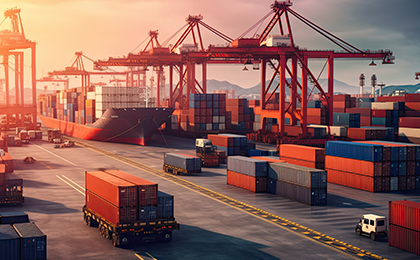


Industries

Logistics Sector
The Logistics Industry is a critical sector that encompasses the planning, implementation, and control of the efficient, effective forward, and reverse flow and storage of goods, services, and related information from the point of origin to the point of consumption.
The Logistics Industry is a critical sector that encompasses the planning, implementation, and control of the efficient, effective forward, and reverse flow and storage of goods, services, and related information from the point of origin to the point of consumption. It plays a vital role in facilitating trade, connecting businesses, and ensuring the timely delivery of products across the globe.
Key Components of the Logistics Industry
1. Transportation:
Road freight (trucking, LTL, FTL)
Rail freight
Air freight
Sea freight (shipping)
Pipeline transportation
2. Warehousing and Storage:
Distribution centres
Fulfilment centres
Cold storage
Bonded warehouses
3. Freight Forwarding and Brokerage:
Arranging transportation and documentation
Customs brokerage
Supply chain consulting
4. Supply Chain Management (SCM):
Planning and forecasting
Inventory management
Order processing
Supplier relationship management
5. Logistics Technology:
Transportation Management Systems (TMS)
Warehouse Management Systems (WMS)
Tracking and tracing technologies (GPS, RFID)
E-commerce logistics solutions
Data analytics and optimization tools
6. Value-Added Services:
Packaging and labelling
Assembly and kitting
Reverse logistics (returns management)
Insurance and risk management
Importance of the Logistics Industry
• Facilitation of Trade: Enables the movement of goods between producers and consumers, both domestically and internationally, which is fundamental to global commerce.
• Economic Growth: Supports industries by ensuring the efficient flow of raw materials and finished products, contributing to overall economic productivity.
• Supply Chain Efficiency: Optimizes the movement and storage of goods, reducing costs and improving delivery times.
• Global Connectivity: Connects businesses and markets across geographical boundaries, fostering international trade and collaboration.
• Support for E-commerce: Plays a crucial role in the success of online retail by managing the storage, packaging, and delivery of goods to consumers.
• Job Creation: Employs a significant workforce across various functions, from transportation and warehousing to technology and management.
• Improved Quality of Life: Ensures the availability of essential goods, including food, medicine, and consumer products, contributing to overall well-being.
The Logistics Industry is constantly evolving to meet the demands of a globalized economy, driven by technological advancements, changing consumer expectations, and the need for more sustainable and resilient supply chains.
